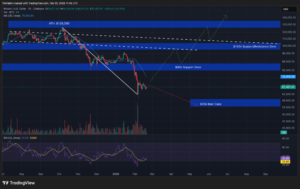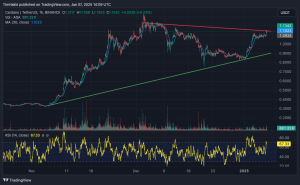Last updated:
 Why Trust Cryptonews
Why Trust Cryptonews
Ad Disclosure
We believe in full transparency with our readers. Some of our content includes affiliate links, and we may earn a commission through these partnerships. Read more

Solana developers have unveiled a new hashing system designed to tackle scalability issues arising from increased network usage.
The proposal, titled SIMD-215, introduces a lattice-based homomorphic hashing function that aims to streamline how the network verifies and tracks user accounts, ultimately allowing it to handle billions of accounts efficiently.
Solana Recalculates State of All Accounts Regularly
Currently, the Solana network recalculates the state of all accounts regularly, a process that becomes increasingly cumbersome as the user base grows.
Anatoly Yakovenko, co-founder of Solana Labs, noted this issue, known as the “state growth problem,” in a recent post on X.
He explained that creating new accounts requires the network to verify their uniqueness, which is computationally expensive under the current system.
The runtime must maintain a global index of all accounts, creating significant overhead for every network node.
The Accounts Lattice Hash, outlined in the proposal, aims to eliminate this bottleneck by introducing instant verification, removing the need to recalculate the entire state of all accounts.
The homomorphic hashing function allows the network to update its state by processing only the accounts that have changed, rather than recalculating everything.
Crypto research firm Republik Labs likened the approach to cleaning a house, where only messy rooms are tidied rather than scrubbing the entire house daily.
This method promises to save time and computational resources while maintaining system integrity.
If implemented, the proposal could significantly enhance Solana’s speed and efficiency, making it better equipped to handle mass adoption.
Solana remains a key player in decentralized finance (DeFi) and on-chain activity, outpacing Ethereum in trading volume across decentralized exchanges (DEXs).
According to DefiLlama data, Solana’s DEXs recorded over $113 billion in trading volume last month, compared to Ethereum’s $78.9 billion, reflecting its growing dominance in the space.
Solana Overtakes Ethereum in Terms of Developer Number
As reported, Solana has overtaken Ethereum as the top destination for new developers in 2024, breaking Ethereum’s eight-year dominance in the space.
According to a December 12 report by Electric Capital, Solana saw 7,625 new developers join its ecosystem this year, surpassing Ethereum’s 6,456.
The surge was driven largely by increased developer activity in Asia.
Notably, Solana also briefly surpassed Ethereum on two significant occasions.
On March 18, Solana’s network activity exceeded Ethereum’s due to heightened demand for Solana-based meme coins.
Later, on October 28, Solana’s daily network fee generation surpassed Ethereum’s for a 24-hour period.
In another incident, earlier this month, prominent blockchain researcher Max Resnick announced that he has shifted from Ethereum infrastructure firm ConsenSys to SOL-focused R&D company Anza.
Resnick previously led research at ConsenSys’ Special Mechanisms Group, where he voiced support for alternative scaling models.



















